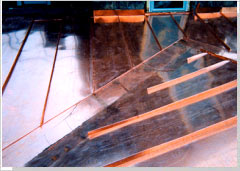 Essential to different industrial sectors, metal coating provides surface protection to many of the products that we purchase. Metal coating is used to form a layer, which changes the surface properties of the workpiece to those of the metal being applied. The workpiece becomes a composite material that exhibits properties usually, which cannot be achieved by either material if used alone. The coatings provides a durable, corrosion resistant layer, and the core material furnishes the load bearing capability. The deposition of metal coatings, such as nickel, chromium, cadmium, and copper, is generally achieved by wet chemical processes, which have inherent pollution control problems.
Essential to different industrial sectors, metal coating provides surface protection to many of the products that we purchase. Metal coating is used to form a layer, which changes the surface properties of the workpiece to those of the metal being applied. The workpiece becomes a composite material that exhibits properties usually, which cannot be achieved by either material if used alone. The coatings provides a durable, corrosion resistant layer, and the core material furnishes the load bearing capability. The deposition of metal coatings, such as nickel, chromium, cadmium, and copper, is generally achieved by wet chemical processes, which have inherent pollution control problems.
Metallic coatings are deposited by electroplating, electroless plating, shot dipping, praying, ion vapor deposition and chemical vapor deposition. Some crucial coatings are chromium, cadmium, nickel, zinc and aluminum. Plating and surface treatment processes are generally batch processes, in which metal objects are dipped into and then removed from baths containing several reagents to attain the desired surface condition. The procedures involve moving the object being coated through a series of baths engineered to create the desired end product. Depending on the level of sophistication and modernization of the facility and the requirement, the processes can be manual or highly automated.
The most widely used method of metal coating for corrosion protection is galvanizing that involves the application of metallic zinc to carbon steel for the purpose of corrosion control. Hot-dip galvanizing is the most common method that comprises of dipping the steel member into a bath of molten zinc.
Metallizing can be defined as the application of very thin metallic coatings for either as a protective layer (stainless steel and alloys) or active corrosion protection (zinc or aluminum anodes). Application can be by electroplating or flame spraying. Other modern processes, such as plasma arc spraying can be used for exotic refractory metals for most demanding applications, however, most of the advanced processes are not used for corrosion control.
AdvantagesSome of the important advantages of metal coating include -
- Superior protection for metal surfaces against rust, oxidation and corrosion
- Minimizing friction
- Protection from chemicals
- Easing assembly and disassembly
- Simplifying cleanup and providing non stick characteristics
